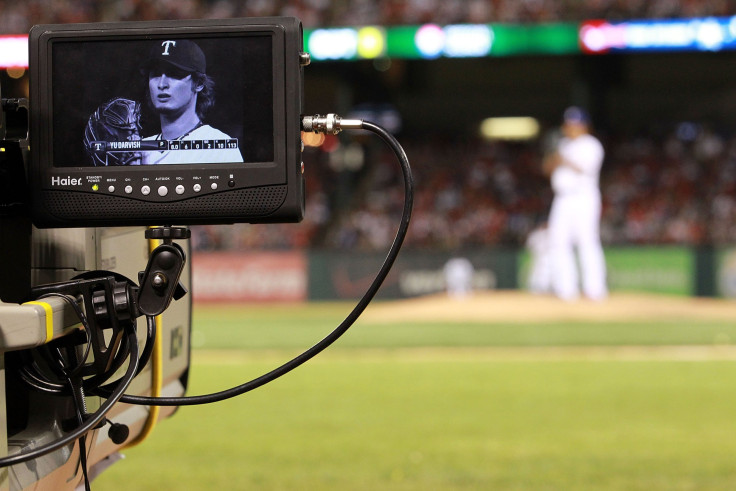ESPN, Fox, CBS And NBC Explain Why The Cost Of TV Sports Is Going To Keep Going Up And Up And Up

In 1989, a then-fledgling cable sports network called ESPN took a deep breath and signed a $400 million deal with Major League Baseball for the right to broadcast its games for four years. At the time, $400 million -- a little more than $750 million in today’s dollars -- felt like an astronomical sum to pay for any kind of content. Today, that probably wouldn’t buy you the rights to a season of competitive foosball.
The price of sports broadcast TV rights has been on a seemingly endless upward climb, and the rise has inflated Americans' cable bills. Yet at “Sports Television: Winning the Game of Disruption,” a panel hosted by the Paley Center for Media Wednesday, the heads of America’s four biggest sports television broadcasters – NBC Sports Chairman Mark Lazarus, CBS Sports Chairman Sean McManus, Fox Sports President Eric Shanks and ESPN President John Skipper – said they still see world’s most expensive kind of television content as a good investment.
“We don’t pay exorbitant amounts,” ESPN President John Skipper said Wednesday. “We pay large amounts, because they’re very valuable.”
That value extends well beyond the ability to charge top dollar for ad space during a big game, or the clout to demand hefty affiliate fees. As television becomes something that’s streamed rather than aired, as video becomes more integral to the social Web, and as sports gambling moves closer to becoming a reality, networks are using their live sports portfolios as springboards to new audiences, new revenue streams and stronger presences on new digital platforms.
“Sports overindexes on every one of these platforms,” CBS Sports Chairman McManus said.
The Tide That Lifts
Because sports content is so important to a game's most passionate fans, networks can use their games to push fans onto new channels or services the networks are building. For example, NBC’s coverage of the English Premier League’s Championship Week will be spread out across 10 different channels for a second consecutive year.
NBC Sports Chairman Lazarus told International Business Times he's anticipating improved ratings this year, and he credits the English Premier League for helping put NBC Sports Network and other channels on the map. "I think it absolutely helped us build our brand," Lazarus said.
That ability to instantly drive eyeballs to a new product is rare, and some networks already have plans to use it. Lazarus told his audience Wednesday that NBC is working to offer local, market-specific digital streams of NHL games as well.
Buying Protection
Ultimately, the price for these rights keeps going up because all four networks understand that it is better to have them than not to have them, especially because the number of companies vying for them could grow. Earlier this year, news emerged that the NFL might stream one of its regular season games online. And as more and more consumers get used to watching TV on mobile devices, some panelists envisioned a world where a competitor could assemble a strong portfolio of sports and use it to launch a strong digital or mobile product.
“I think somebody will be a first mover to use sports as an advantage,” Fox Sports President Eric Shanks said.
Asked whether he thought Google might present a long-term threat, Shanks offered a response that sounded more resigned than skeptical. “Their resources are what they are,” he said. “If it's something they decide to do, there's nothing stopping them.”
Betting Big
One of the things that’s fueled America’s interest in sports has been the meteoric rise of daily fantasy, a turbo-charged version of fantasy sports that most accept as gambling in everything but name. While not all four networks are involved in daily fantasy, others are investing heavily in it.
"It is legal and we embrace it," Lazarus said.
As the price for sports rights continues its upward climb, it has not come without consequences. The cost of these games is being passed on to consumers; Time Warner Cable spokesperson said the cost of broadcast networks like ABC, CBS, NBC and Fox has gone up 60 percent, and the amount of money Time Warner Cable has had to pay to hold onto its sports programming has nearly doubled since 2008.
Not that the broadcasters mind. According to Fox Sports President Eric Shanks, the market capitalization of the four companies represented at Wednesday’s panel has tripled over the same period.
[Correction: An earlier version of this story incorrectly attributed a quote about daily fantasy to CBS Sports Chairman Sean McManus.]
© Copyright IBTimes 2024. All rights reserved.





















